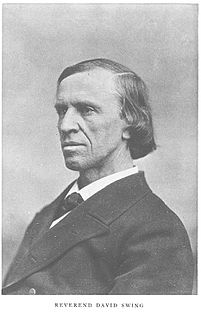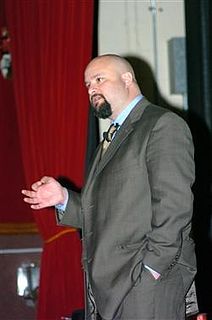A Quote by Ralph Waldo Emerson
Ethics and religion differ herein; that the one is the system of human duties commencing from man; the other, from God. Religion includes the personality of God; Ethics does not.
Related Quotes
The modern Gamaliel should teach ethics. Ethics is the science of human duty. Arithmetic tells man how to count his money; ethics how he should acquire it, whether by honesty or fraud. Geography is a map of the world; ethics is a beautiful map of duty. This ethics is not Christianity, it is not even religion; but it is the sister of religion, because the path of duty is in full harmony, as to quality and direction, with the path of God.
Religion is the only solid basis of good morals; therefore education should teach the precepts of religion, and the duties of man toward God. These duties are, internally, love and adoration: externally, devotion and obedience; therefore provision should be made for maintaining divine worship as well as education. But each one has a right to entire liberty as to religious opinions, for religion is the relation between God and man; therefore it is not within the reach of human authority.
True religion is not talk, or doctrines, or theories, nor is it sectarianism. It is the relation between soul and God. Religion does not consist in erecting temples, or building churches, or attending public worship. It is not to be found in books, or in words, or in lectures, or in organizations. Religion consists in realization. We must realize God, feel God, see God, talk to God. That is religion.
All the world’s major religions, with their emphasis on love, compassion, patience, tolerance and forgiveness, can and do promote inner values. But the reality of the world today is that grounding ethics in religion is no longer adequate. This is why I believe the time has come to find a way of thinking about spirituality and ethics that is beyond religion.
One key and defining attribute of God that does not appear in any other world religion or system is the biblical use of the term "Father." Over 70 times in the New Testament alone, God is described as "Father" to His children. No major world religion describes the relationship between its creator and its adherents in terms of a father.
Those of us who believe in God and derive our sense of right and wrong and ethics from God's Word really have no difficulty whatsoever defining where our ethics come from. People who believe in survival of the fittest might have more difficulty deriving where their ethics come from. A lot of evolutionists are very ethical people.
Christianity is NOT a religion; it is the proclamation of the end of religion. Religion is a human activity dedicated to the job of reconciling God to humanity and humanity to itself. The Gospel, however - the Good News of our Lord and Savior, Jesus Christ, is the astonishing announcement that God has done the whole work of reconciliation without a scrap of human assistance. It is the bizarre proclamation that religion is over - period.
Interest in religion is not necessarily interest in God. Religion in public life means a set of ideas, an ideology that has certain positions. Religion is then one more ideology among others. Religion is about God. Religion begins with a relationship to God, not a relationship to an idea. It is God who is an actor, not just individuals who have certain beliefs who are actors. God is an actor.
The very essence of political philosophy is the carving out of an ethical system - strictly, a subset of ethics dealing with political ethics. Ethics is the one rational discipline that demands the establishment of a rational set of value judgments; political ethics is that subset applying to matters of State.
Christians believe that God created man, and humanists believe that man invented God. But whichever way you look at it, we're brothers and sisters. Either we're brothers and sisters because we're children of God, or because we've banded together to invent God. So the ethics of the humanist and the ethics of some Christians are very similar. And we don't want to create divisions between humanists and Liberation Theologians, any more than we want between the New Worker and the Trots. It's not helpful.









































